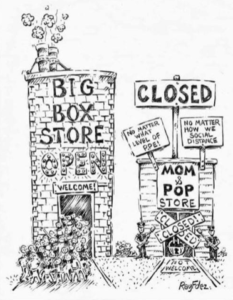 “What Twitter is and what YouTube is are way bigger than a social media company. There is a real good argument that they should be like public utilities.”
“What Twitter is and what YouTube is are way bigger than a social media company. There is a real good argument that they should be like public utilities.”
Joe Rogan – Podcaster/Comedian/MMA Announcer
During this past week, a friend mentioned to me that Facebook was reentering the e-commerce space with Stores: a product that allows businesses to create digital storefronts on Facebook or Instagram. The question that was posed to me was this: “Is this rollout a good thing for small businesses?” In my opinion, the answer is a resounding NO!!!
The retail market is entering a critical stage, and vendors have limited places to sell products. Over the past few weeks, well known retailers JC Penney, J. Crew and Neiman Marcus have filed for bankruptcy to help them contend with rising brick and mortar costs. Even before the pandemic descended upon us, the consumer shift to the online shopping world had become more and more evident. According to Coresight Research, U.S. merchants have shut down over 6,000 physical retail locations in both 2018 and 2019. A longer-term retail outlook — this one from investment firm UBS — said that an estimated 75,000 brick-and-mortar stores are likely to shut down by 2026. And former 2020 Democratic Presidential candidate Andrew Yang made the elimination of blue collar jobs like those found at retail stores part of his platform. Clearly, this movement away from the brick and mortar stores has been happening for a long time because there are many benefits to selling products online.
But do the benefits of shifting our purchase patterns outweigh the risks and the potential long-term costs? Right now, there is a clear leader in the e-commerce space – Amazon. At first glance, Amazon has literally anything that you want to buy online. Amazon has a huge economic advantage over everyone else because of their sprawling warehouse system, which makes it possible to fulfill all products at a cheaper price while offering free shipping and free returns. Amazon also has the power to force suppliers to accept terms that are more beneficial to Amazon and may ultimately handcuff the supplier in the long run. Here’s an illustrative example of the difference between ordering directly from a company vs. buying products on Amazon. I love cooking spices, and one of my favorite brands to flavor my food with is “Company AS”. This company has a lot to choose from, but a personal favorite of mine is the “AS Egg Crack”. If you order the product directly from their website, one bottle of AS Egg Crack will cost you $13.25 which includes $7.25 for shipping costs. If you go Amazon, you can purchase the same product for $9.99, including free shipping. For every order that is processed directly on Company AS’s website, the company maintains a margin of approximately 70% and the shipping costs are passed directly to the consumer with no markup. Compare this to ordering it on Amazon’s site, where the proceeds are split 70-30 and all customer data remains with Amazon. And as an additional detriment, Amazon also recommends a rival brand of spices when you are viewing the product prior to completing the order.
The soon-to-be open Facebook Stores is being marketed as a way for small company owners to maximize their potential sales to the Facebook community. In the press release that announced the new venture, Mark Zuckerberg said, “the vast majority of Facebook advertisers are small businesses, so ensuring they can operate is important to Facebook’s business as well.”
Helping them to operate the business is different than making each company so reliant on Facebook that small businesses cannot afford to market their products and services elsewhere. Facebook’s share jumped 3% on the publication of this new e-commerce space because Wall Street saw it for what it was – a power grab where Facebook can control the advertising that is displayed on a consumer’s feed, determine which products get displayed and to what prominence, and hold onto the consumer data to help it learn more about its users. This user data – privacy issues aside – will be used by Facebook to leverage negotiations with companies to charge more for both advertising on the platform and the commissions that they will take for selling it on their platform. This strategy, combined with its ownership of other well-known platforms like Instagram and WhatsApp, is setting Facebook up to become the only choice for small business owners to sell their products online.
A key concept of capitalism is having a free market where both consumers and companies have multiple choices to purchase products and where they want to sell their goods. Macroeconomic and microeconomic factors are forcing entrepreneurs to make decisions to survive in the current environment instead of looking out for their best interests in the immediate and long-term future. The current pandemic continues to significantly impact the small business community and the owners of these businesses will look for ways to pivot and adapt to the ever-changing nature of its consumer. As consumers, we need to be more conscious of the purchasing decisions we make and how it impacts the companies we buy them from. Until the government begins to address this growing anti-competitive environment, consumers like you and me need to find ways to directly support the small business community.
Takeaway: Being a small business owner is not easy, and navigating the e-commerce world is intimidating if you are not clear on the financial and operating goals of your company in the Internet space. For a free consultation on how to present your company in the best digital fashion, please email us at info@acceleratingcfo.com or call us at 917-528-1832.
Co-founders & Managing Partners
AcceleratingCFO